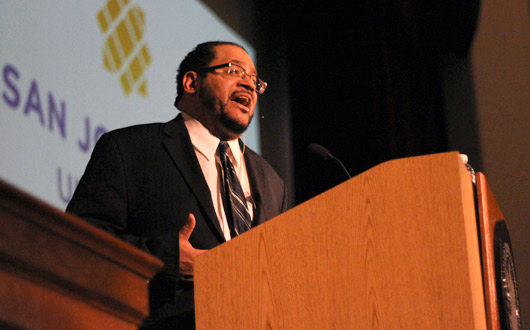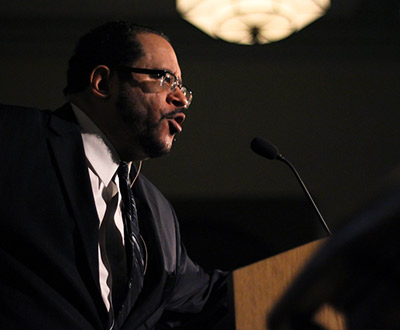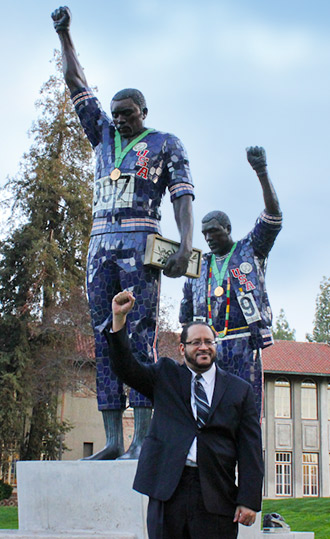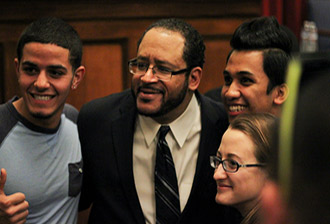
Michael Eric Dyson, acclaimed author, professor, political analyst and holder of a doctorate in religion, delivered a provocative lecture in response to alleged hate crimes at San Jose State (Christina Olivas photo).
Race: a topic some may dare not to whisper, Michael Eric Dyson boldly addressed with the dynamic, poetic cadence of a reverend and a rapper as he spit the lyrics of Ice Cube, Tupac Shakur and Biggie Smalls to tackle the question, “Are we post-racial, or is racism still a problem?”
Dyson, acclaimed author, professor, political analyst and holder of a doctorate in religion, delivered a provocative lecture in response to alleged hate crimes at San Jose State. More than 500 people of different ethnicities, genders and ages flooded Morris Daily Auditorium, sitting and standing for the lecture Monday evening.
Is racism an issue in 2014?
Before the lecture, Adam Ahmed, ’17 Microbiology, and a member of the lecture’s planning team, said he was curious about Dyson’s take on race as he found it shocking that in 2014 racism is still a problem, especially at SJSU. However, other attendees anticipated Dyson’s lecture would shed light on a dark reality in America.
I think it’s interesting how people of color seem to be the only ones who think that racism still exists and that it’s still a prevalent issue,” said Najma Sadiq, a DeAnza College student.
“I hope Mr. Dyson definitely breaks all the stereotypes and lets people know that it’s real, it exists and what happened [at SJSU] is a clear-cut definition that it does still exist in 2014.”
Dyson did address the current and past existence of racism as he said even in “hot beds of liberalism,” cases such as the alleged hate crimes at SJSU are very real. Dyson compared racial issues to a boil that one must sometimes “slice open and let the puss spill out.”
Dispelling the makeup of a racist
During the lecture, Dyson walked the audience through the history of race in America. He emphasized the vast importance of understanding America’s racialized history before we can move forward.
The very people who acknowledge the racial chasm are themselves said to be the reason for the racial chasm because they keep talking about the racial chasm.”
Dyson expressed how this concept is almost as absurd as blaming a diseased person for the creation of their disease. His voice boomed in the auditorium as he went on to make three points relating to how people can respect race and differences.
Hierarchy and specificity, not exclusivity
“We’re obsessed with hierarchy,” he said, making his first point that society must learn to nurture the differences in people without ranking them. “In other words, you ain’t got to be what the mainstream says you ought to be in order to be acknowledged as something worthy to exist.”
Next, he encouraged the audience to develop an appreciation for racial specificity without being racially exclusive, which means one must realize that race is an essential part of individuals’ stories in the United States.
Lastly, he said diversity must be for the sake of a just goal. For example, if people of diverse ethnic backgrounds ostracize someone based on sexual orientation, an injustice is being perpetuated amidst superficial diversity.
You have to hold on to the courageous assertion of your identity,” he said. “The reason you come [to SJSU] is to make a contribution and to challenge the norm.”
During the question and answer period, Rigo Garcia, ’15 Mexican American Studies, shared his observation that although the university touts diversity, ethnic studies departments don’t have the perceived support that one may expect.
This was promoting diversity for an unjust goal, Garcia said, before asking how he can be part of those who instead seek diversity for justice within the ethnic studies programs.
Myth of a post-racial society
After the questions subsided, audience members rushed and crowded Dyson for handshakes and pictures. Ahmed said he was struck by the professor’s point that we are not in a post-racial society even though the country has its first black president.
“People believe with [President Barak Obama’s] election that we are done with race, ‘been there done black,’” Dyson stated, followed by laughs from the audience as he explained much remains undone.
Ahmed said Obama’s success may have contributed to his previous thoughts, adding that he now wanted to ask Dyson,
What happens next? This is not the first talk like this [about race relations]. Will we ever see true unity in this country?”



